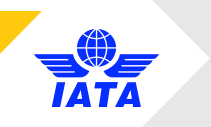 IATA has called on governments in the Middle East to harmonise biosafety measures for passengers across the region as aviation restarts. A global framework for restarting aviation while protecting public health has been agreed by the International Civil Aviation Organization (ICAO) and published in the Take-Off guidance. However, inconsistent application of these biosafety measures along with unnecessary border constraints are deterring passengers and suppressing the resumption of air travel in the Middle East.
IATA has called on governments in the Middle East to harmonise biosafety measures for passengers across the region as aviation restarts. A global framework for restarting aviation while protecting public health has been agreed by the International Civil Aviation Organization (ICAO) and published in the Take-Off guidance. However, inconsistent application of these biosafety measures along with unnecessary border constraints are deterring passengers and suppressing the resumption of air travel in the Middle East.
“We are starting to see some governments in the Middle East open their borders to regional and international air travel. This is good news but those flying for the first time since the lifting of restrictions face an array of different types of biosafety measures and procedures – which is causing confusion among passengers and delaying the recovery,” said Muhammad Albakri, IATA’s Regional Vice President for Africa and the Middle East.
“An effective COVID-19 test has the potential to be a useful risk mitigation measure. However, tests that neither meet the criteria of speed, scalability and reliability nor are offered at reasonable cost, as we are seeing in some countries in the region, have unintended consequences, causing more problems than they solve and will most likely limit the recovery in air travel demand,” said Albakri.
“Imposing quarantine measures on arriving passengers keeps countries in isolation and the travel and tourism sector in lockdown. Fortunately, there are policy alternatives that can reduce the risk of importing COVID-19 infections while still allowing for the resumption of travel and tourism that are vital to jump starting national economies. We are proposing a framework with layers of protection to keep sick people from travelling and to mitigate the risk of transmission should a traveller discover they were infected after arrival,” said Albakri.
“The collection of self-declared passenger health data is a transaction that must occur solely between passengers and authorities, even more so during health outbreaks. Airlines should not be responsible for collecting this data. We urge governments to develop web portals dedicated to collect passenger health data. This is the safest, most robust and efficient solution for passengers to provide necessary data to authorities during the COVID-19 crisis and in the future,” said Albakri.
 Tourism Breaking News
Tourism Breaking News


